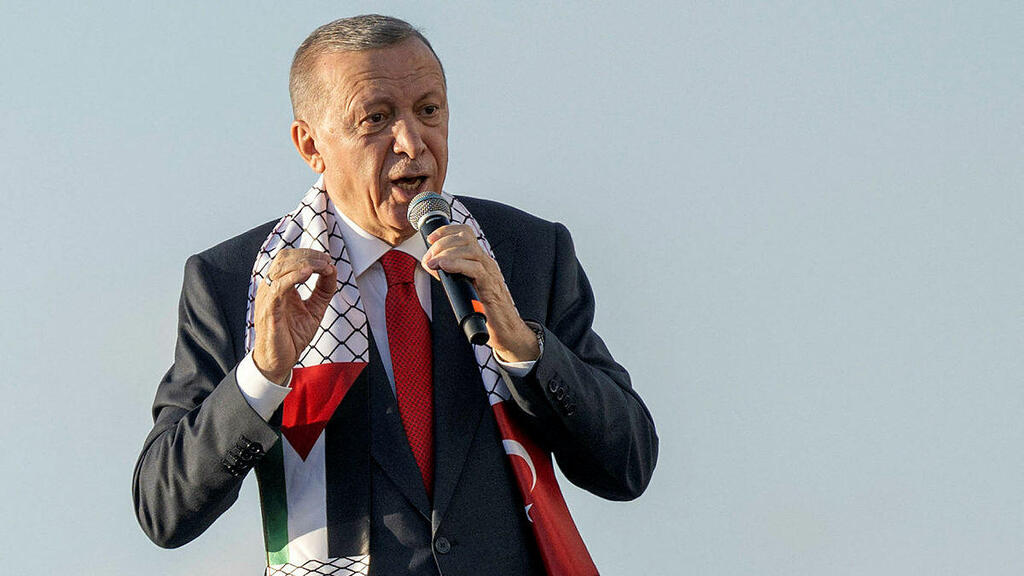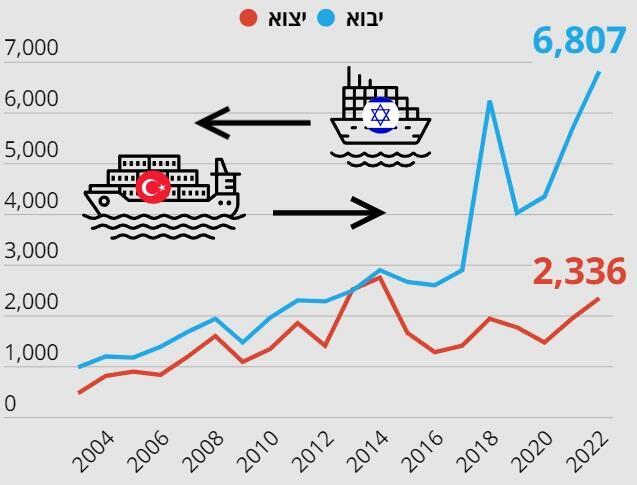About three and a half weeks since the beginning of the war in Gaza, Israeli businessmen can't help but wonder about how relations between Israel and Turkey and fear they could reach the point of collapse.
Since the Gaza flotilla incident of 2010, the relationship between the two countries has been characterized by strained diplomatic ties. However, despite the political friction, their trade relations have managed to flourish.
Read more:
Even in the face of political animosity between Ankara and Jerusalem during those years, trade between the two nations has expanded and even thrived. In 2022, the volume of trade between the two countries reached an all-time high, totaling $9.1 billion according to data from the Foreign Trade Administration at the Economy Ministry.
Erdogan's response to Israel following its recent extensive actions in Gaza was as predictable as mushrooms sprouting after rain. His disregard for the massacre in Israel, while pointing the blame at Israel for supposedly massacring Palestinians in Gaza and committing war crimes, and his assertion that Hamas is not a terrorist organization, falls on deaf Israeli ears. It remains consistent background music to almost every high-intensity military conflict between Israel and the Palestinians.
Israeli economists closely engaged in trade with Turkey have been pondering lately just how far Erdogan will go with his anti-Israel rhetoric. They believe that the continuation of the war with Gaza, set against the backdrop of distressing images of destruction, casualties and humanitarian crises, will further muddy the waters of Erdogan's rhetoric towards Israel. They are uncertain about where his breaking point may lie.
The current reality in Israel and the entire Middle East is tumultuous, raising the possibility that the prolonged war might trigger a Turkish response unlike any we've seen in the past. One that may not be limited to mere inflammatory rhetoric that is hard for Israeli ears to swallow, but could also manifest in concrete actions on the ground.
In 2022, Israel imported goods from Turkey worth approximately $6.8 billion. The majority of these imports consisted of iron, wheat, automobiles, household electrical appliances, processed food products and plastic items. In the same year, Israel exported goods to Turkey valued at around $2.3 billion, including chemicals, finished plastic products and petroleum products.
Leading supermarket chains have been sourcing vegetables from Turkey, primarily tomatoes, which has become especially prominent in recent weeks. This influx has resulted in a surplus, impacting local farmers in the Gaza envelope region. Some supermarket chains explained the situation as a response to the tomato shortage, with prices exceeding 15 shekels per kilogram, but the Turkish imports have caused a significant drop in prices.
Amid the preference for Turkish produce available in Gaza, farmers in the Gaza order area are cautious about the potential economic crisis. In addition to the deep crisis the entire region has been facing since the Hamas attack, they fear that it might exacerbate the economic challenges within the agriculture sector.
Over the past few years, the Israeli government has encouraged imports while removing extensive tariffs, even if it comes at the expense of the local industry. A senior official of a major economic body told Calcalist Monday that "it seems that we are starting to pay a price for having sanctified imports. Every time during the last few years a new minister would come and on his business card he would write the fight against the cost of living and in the name of this fight we devoted ourselves to imports, of everything."
A source involved in the trade relations between the two countries said on Monday that "unlike any previous conflict with Turkey, the current situation is much more complex and severe. The circumstances are much more acute and serious. Events are happening at a level of intensity and strength that we haven't seen before, and Erdogan is merely reacting to them. He is not the central player in this scenario, and neither is Israel. The coming period will be critical."
First published: 00:57, 11.01.23



